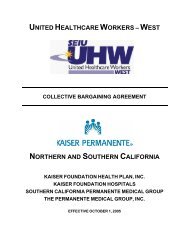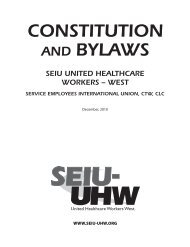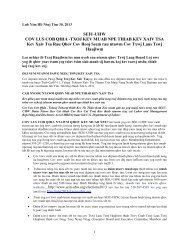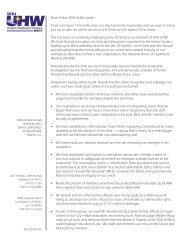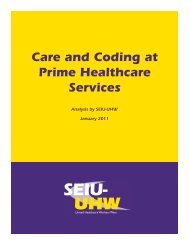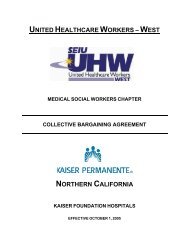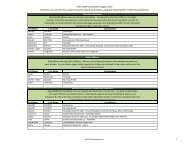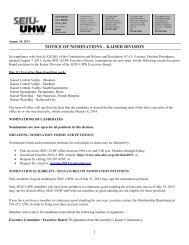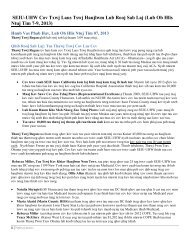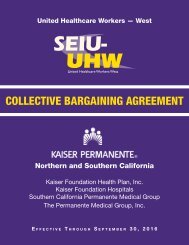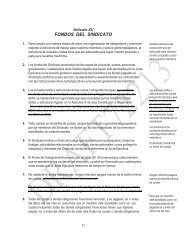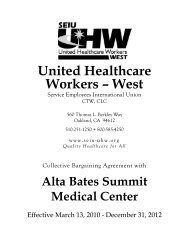How Prime Healthcare Services - SEIU-UHW Healthcare Workers ...
How Prime Healthcare Services - SEIU-UHW Healthcare Workers ...
How Prime Healthcare Services - SEIU-UHW Healthcare Workers ...
Create successful ePaper yourself
Turn your PDF publications into a flip-book with our unique Google optimized e-Paper software.
<strong>How</strong> <strong>Prime</strong> <strong>Healthcare</strong><br />
<strong>Services</strong>’ Business Practices<br />
Are Harming Patients,<br />
Consumers, Caregivers<br />
and Communities<br />
A <strong>Prime</strong>r on California’s Largest For-Profit Hospital Chain<br />
“A Southern California hospital chain known for aggressive billing practices and cost-cutting is<br />
being investigated by state and federal authorities for an unusually high rate of life-threatening<br />
infections among its older patients.”<br />
“U.S., California probe <strong>Prime</strong> <strong>Healthcare</strong>.” Los Angeles Times, October 12, 2010<br />
“Since taking over the hospital late last year, its new owner has shuttered departments, laid off<br />
13% of its 1,700 staffers and canceled most private insurance contracts, hospital officials say. As a<br />
result, many residents say they’ve had to seek treatment elsewhere.”<br />
“Hospital’s cuts sow anxiety in South L.A.: Changes at Centinela deal a fresh<br />
blow to the area’s healthcare.” Los Angeles Times, May 29, 2008<br />
Five of the six hospitals with the highest septicemia rates in the United States were all operated by <strong>Prime</strong><br />
<strong>Healthcare</strong> <strong>Services</strong>, Inc.—out of some 2,900 U.S. hospitals. <strong>Prime</strong>’s septicemia rates have led the U.S. Department<br />
of Health and Human <strong>Services</strong> and the California Department of Justice to open official investigations into <strong>Prime</strong> to<br />
determine whether the chain’s surge in life threatening septicemia cases is authentic or really a multimillion-dollar<br />
Medicare fraud, according to the LA Times.<br />
A startling eight of the nine hospitals with the highest malnutrition rates in California were operated by <strong>Prime</strong>,<br />
and all <strong>Prime</strong> hospitals were in the top 7% for highest total malnutrition rate nationally in 2009. Particularly<br />
noteworthy is the rate at which <strong>Prime</strong> diagnoses elderly patients with kwashiorkor, a form of severe malnutrition<br />
found chiefly among impoverished children during famines in developing nations. The federal Medicare system pays<br />
bonuses for treatment of malnutrition and enhanced bonuses for treating kwashiorkor.<br />
Even before these concerns were exposed <strong>Prime</strong> CEO Prem Reddy had a track record of buying poor hospitals and<br />
profiting at the expense of patients, caregivers and communities.<br />
Reddy uses aggressive legal and financial tactics to seize control of hospitals over local objections. It’s not hard to<br />
see why communities fight Reddy takeovers of local hospitals. He:<br />
■ cancels contracts with insurers, leaving thousands of patients without a nearby in-network hospital;<br />
■ puts patients in the middle of the billing disputes that serve as “the largest example of this egregious practice<br />
we’ve seen,” according to the top state regulator;<br />
■ cuts services like mental health care, chemotherapy and birthing centers he considers unprofitable; and<br />
■ slashes pay and benefits for workers, often laying off scores of experienced caregivers.<br />
APRIL 2011
<strong>Prime</strong>’s Strategy for Making Money<br />
<strong>Prime</strong> operates 14 hospitals, all in California. The average U.S. hospital barely<br />
breaks even, but <strong>Prime</strong>’s facilities are tremendously profitable. In 2010, <strong>Prime</strong><br />
made a profit of over $247 million.<br />
AGGRESSIVE TACTICS FOR CONTROL OF COMMUNITY HOSPITALS<br />
From Redding to Riverside, <strong>Prime</strong> has engaged in aggressive tactics to<br />
take over ailing community hospitals, from acquiring hospitals’ debts to<br />
gain leverage in bankruptcy proceedings to engaging in backroom<br />
negotiations to position itself as a purchaser. Communities are<br />
beginning to take note and mount opposition to <strong>Prime</strong> takeovers. In<br />
November 2010, <strong>Prime</strong> attempted to purchase bankrupt Victor Valley<br />
Community Hospital in Victorville. In a San Bernardino Sun op-ed,<br />
community leaders wrote, “We believe that concerns about <strong>Prime</strong><br />
<strong>Healthcare</strong>’s practices are too serious to allow the company to purchase<br />
Victor Valley Community Hospital without scrutiny and under<br />
circumstances that have not been put to a public debate.” <strong>Prime</strong>'s bid<br />
to take over the hospital was rejected by the board.<br />
CANCELING CONTRACTS<br />
Insurance companies are required by California law to pay for emergency services, even at out-of-network providers.<br />
This law protects patients in an emergency—patients who don’t necessarily have time to get to an in-network<br />
provider. <strong>Prime</strong> strains these well-intentioned California laws by canceling all contracts with providers and demanding<br />
top dollar for emergency room services. Once admitted, managed care providers allege that <strong>Prime</strong> tries to limit<br />
transfers of insured patients in order to maximize reimbursement. A side effect of this behavior is that community<br />
access to routine hospital care is reduced.<br />
PUTTING PATIENTS IN THE MIDDLE<br />
When a patient’s insurance company paid <strong>Prime</strong> for care patients received, instead of working out disputes about the<br />
payment amount with the insurer, the company allegedly went right to the patient to demand payment, according to<br />
a lawsuit filed by the California Department of Managed <strong>Healthcare</strong> (DMHC) in 2008. This practice, known has<br />
“balance billing,” has now been unanimously ruled illegal by the state supreme court. According to the DMHC<br />
director Cindy Ehnes, <strong>Prime</strong> <strong>Healthcare</strong> was one of the worst offenders. The lawsuit was settled May 11, 2010; terms<br />
of the settlement required <strong>Prime</strong> to repay patients who were billed improperly, and to make $1.2 million in charitable<br />
donations including $100,000 to six community clinics.<br />
SQUEEZING WORKERS<br />
Community leaders in the High Desert came<br />
together to expose <strong>Prime</strong> and oppose purchase<br />
of their bankrupt hospital in November 2010.<br />
Despite making record profits in these hard economic times, <strong>Prime</strong> has proposed in collective bargaining with <strong>SEIU</strong>-<br />
<strong>UHW</strong>, its largest healthcare workers’ union, massive wage cuts for new hires at its Centinela Hospital in Inglewood –<br />
starting new CNAs at poverty wages of $8.50 an hour. The company wants to increase the cost of family healthcare<br />
from free to as much as $6,600 per year, forcing employees to drop family members from healthcare because they<br />
cannot afford it. <strong>Prime</strong> also wants to eviscerate the committee that enables caregivers to advocate effectively for<br />
quality patient care.<br />
Hundreds of workers were laid off when <strong>Prime</strong> took over Centinela<br />
Hospital in 2007. And within 24 hours of <strong>Prime</strong>’s official takeover of Shasta<br />
Regional Medical Center in 2008, over 150 workers were fired without<br />
notice. <strong>Prime</strong> denies responsibility to this day, saying the layoffs happened<br />
in the hours before <strong>Prime</strong> took over.<br />
<strong>Healthcare</strong> workers at Centinela and other hospitals bought<br />
by <strong>Prime</strong> are speaking out for quality care and jobs.
HOLDING PRIME ACCOUNTABLE<br />
<strong>Prime</strong> has come under increasing scrutiny by the media, community groups,<br />
healthcare workers’ unions and federal and state lawmakers and regulators.<br />
SURGE IN SEPTICEMIA PROMPTS FEDERAL, STATE INVESTIGATIONS<br />
In October 2010, the Los Angeles Times, California Watch, and numerous local media outlets revealed that federal<br />
and state authorities are investigating whether a surge in septicemia throughout <strong>Prime</strong>’s hospitals represents a<br />
serious health problem or potential multi-million dollar Medicare fraud. Septicemia is a life-threatening blood<br />
infection.<br />
These elevated rates translate to higher reimbursements for <strong>Prime</strong> from the federal Medicare program.<br />
Federal investigators are pursuing whether there’s a serious public health risk at <strong>Prime</strong> hospitals or whether the<br />
company is committing fraud against our Medicare program, reaping potential overpayments of $46 million in<br />
2008 and 2009.<br />
Alarmed by <strong>SEIU</strong>-<strong>UHW</strong>’s initial findings on septicemia rates, U.S. Congress members from California, Pete Stark<br />
and Henry Waxman, plus California State Senator Elaine Alquist and Assemblymember Bill Monning, respective<br />
chairs of the state’s Senate and Assembly Health Committees, requested investigations into <strong>Prime</strong>’s practices.<br />
Two possible explanations for <strong>Prime</strong>’s extraordinarily high<br />
septicemia rates are offered by the <strong>SEIU</strong>-<strong>UHW</strong> report. One is a<br />
system-wide pattern of up-coding, whereby <strong>Prime</strong> potentially<br />
billed Medicare for more serious conditions than warranted, and<br />
received higher reimbursements as a result. The other is that every<br />
single <strong>Prime</strong> hospital actually does suffer from an infections crisis.<br />
“Either possibility is deeply concerning to us,” Congressmen<br />
Stark and Waxman wrote.<br />
Alquist, who has authored recent infection-related legislation in<br />
California, states in her letter to the California Department of Public Health (DPH) that a timely investigation by<br />
the department is crucial as, “<strong>Prime</strong> is a fast-growing system and continues to pursue new hospitals.”<br />
She further requests that, “Until these investigations are complete ... you withhold approval of any additional<br />
facility licenses for <strong>Prime</strong> or <strong>Prime</strong>-related facilities.” Assemblymember Monning closed his letter with a similar<br />
recommendation to the department, “Until all of these investigations are complete, I join Senator Alquist in<br />
asking that you withhold any additional facility licenses for <strong>Prime</strong> or <strong>Prime</strong>-related entities.”<br />
MALNUTRTION AT PRIME HOSPITALS<br />
In February 2011, California Watch, the San Francisco Chronicle, and numerous other media outlets revealed that<br />
malnutrition rates at <strong>Prime</strong> hospitals are among the highest in the United States, and that inaccurate billing and<br />
potential Medicare fraud appear to be the cause.<br />
In 2009, <strong>Prime</strong> claimed that about 25% of its Medicare patients<br />
suffered from some form of malnutrition, triple the state average.<br />
Especially alarming is the rate at which <strong>Prime</strong> diagnoses elderly patients<br />
with kwashiorkor, a form of severe malnutrition found chiefly among<br />
impoverished children during famines in the developing nations.<br />
In March 2011, California Senate Health Committee Chair Ed<br />
Hernandez (D-West Covina) asked the California Department of Public<br />
Health to conduct an investigation into <strong>Prime</strong>’s Medicare claims related to<br />
malnutrition. Senator Hernandez also asked Dr. <strong>How</strong>ard Backer, interim<br />
state health director, to delay issuing new operating licenses to <strong>Prime</strong><br />
until the probe is complete.<br />
October 12, 2010<br />
U.S., California probe <strong>Prime</strong> <strong>Healthcare</strong><br />
Investigators are trying to determine whether hospital<br />
chain’s reportedly high rate of blood poisoning cases is<br />
a health problem or involves fraudulent billing.<br />
February 20, 2011<br />
Data raises questions<br />
about hospital chain’s<br />
malnutrition diagnoses<br />
http://taxdollars.ocregister.com/<br />
Septicemia, malnutrition and other major complications of care at <strong>Prime</strong> have resulted in the highest<br />
Medicare reimbursement in the country. Evidence continues to mount that the diagnoses billed by <strong>Prime</strong> leading<br />
to these highly favorable reimbursements are being billed inaccurately.
<strong>Prime</strong> <strong>Healthcare</strong> <strong>Services</strong> Hospitals<br />
<strong>Prime</strong> operates 14 hospitals, all in California.<br />
A. Centinela Hospital Medical Center<br />
B. Encino Hospital Medical Center<br />
C. San Dimas Community Hospital<br />
D. Sherman Oaks Hospital<br />
E. Huntington Beach Hospital<br />
F. La Palma Intercommunity Hospital<br />
G. Garden Grove Hospital and Medical Center<br />
H. West Anaheim Medical Center<br />
I. Chino Valley Medical Center<br />
J. Montclair Hospital Medical Center<br />
K. Desert Valley Hospital<br />
L. Paradise Valley Hospital<br />
M. Shasta Regional Medical Center<br />
N. Alvarado Hospital<br />
JOIN US<br />
A growing coalition of community leaders and healthcare workers—members of Service Employees International<br />
Union-United <strong>Healthcare</strong> <strong>Workers</strong> West (<strong>SEIU</strong>-<strong>UHW</strong>)—are standing up for quality patient care and shining a light<br />
on <strong>Prime</strong> <strong>Healthcare</strong>’s business practices and their impact on our communities.<br />
<strong>SEIU</strong>-<strong>UHW</strong> is the largest healthcare union in the western U.S. with more than 150,000 members and part of the<br />
2.2 million-member <strong>SEIU</strong>. More than 1,300 <strong>SEIU</strong>-<strong>UHW</strong> members work at four <strong>Prime</strong> <strong>Healthcare</strong> hospitals.<br />
Learn more about <strong>Prime</strong> <strong>Healthcare</strong> at www.seiu-uhw.org/prime<br />
For more information, contact Arianna Jimenez, <strong>SEIU</strong>-<strong>UHW</strong>, ajimenez@seiu-uhw.org<br />
or Julian Quinonez, <strong>SEIU</strong>-<strong>UHW</strong>, jquinonez@seiu-uhw.org



